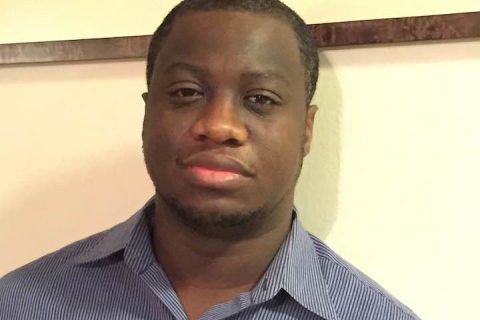I recently read your story “Boxing Day” and I loved this paragraph: “Daddy’s blue moods never care about anyone. Every minute when he’s like this I’m in a four-dimensional world made of endless time: hours lain next to hours, hours stacked atop hours into the sky. He was a broken man reeling from daily compromise. Sarcasm and boxing the only things keeping him together. As for me, I’m one of many chains round his neck that holds him in a cold, tiny basement of mediocrity.” I feel like it epitomizes the narrator in this story: lost in time, simultaneously an adult looking back, as well as the child he was in the memories. Did you always know the son was the narrator?
There’s a novel I’m writing that I only really work on during the holiday season. I usually get the urge to work on it just before Halloween and the feeling leaves me after the new year. “Boxing Day” was originally a part of that book and it’s always been about a son attempting to make sense of his father’s obsession with living in a world in which every day is a holiday, so I’d always known the boy was the narrator. Last year’s work on the novel evolved it away from anything I’d previously written so “Boxing Day” no longer fits the book, but it found a home in my collection, People in Motion, which is coming next year.
One of the reasons I really enjoy reading your fiction is that I can see myself and especially my extended family actually being able to exist in your literary worlds. It can be such a relief to read a story and think I or at least someone who looks like me gets to actually live on the page. What advice would you give to writers–but especially emerging writers of color–about writing the world they experience into fiction?
I’ve always felt that writing toward one’s obsessions is the only responsibility of a writer. Blackness and the the way it interacts with the world and manifests in various cultures has always been fascinating to me. All my life (with brief exceptions) has been lived in a mostly black world–mostly black peers, black family, black neighborhoods, black colleges (as a student and as a professor). I try to write about blackness the way I and–I think–most black people, experience it. Blackness for me is sort of like air, I’m constantly perceiving it, but not really thinking about it as my mind is on more immediate concerns. And then sometimes I’m forced into a hyper-awareness of it and that awareness is at times pleasant, at times noxious.
In a story like “Boxing Day,” the race of the characters is not integral to the plot and it is never mentioned, but it is in the father’s references, his speech. He’s perceiving his blackness, but not necessarily thinking about it.
August Wilson, whose lead I will forever follow, said that you can find the entire human experience within the black experience and that the same is true for any cultural experience. So my advice for writers and especially emerging writers of color (a group in which I am a member) is to follow August Wilson.
If you had to teach someone about narrative using only songs, which ones would you teach? Why?
For the beginning writer I would use Slick Rick’s A Children’s Story because it so clearly follows the Aristotelian path from purpose on through passion to perception. The Little Boy Who Was Misled has a simple want: cash, maybe some thrills. He achieves those things through crime and then he finds his thievery has gotten him more trouble than he anticipated. It ends with The Little Boy realizing he’s wasted his short life. I suppose I could pair that with Boogie Down Production’s Love’s Gonna Get Ya, which basically tells the same story with greater emotional shadings. For the intermediate and advanced writer I’d use the entirety of Kendrick Lamar‘s Good Kid, Maad City. It’s the perfect blend of characterization, heartbreak, humor and narrative experimentalism. I used A Children’s Story in a lecture several years ago and in a recent semester I used, Good Kid, Maad City in my Advanced Fiction class. It worked better than I could have ever imagined. Just asking the question of what the story gains or loses from its non-linear narrative structure opened up whole worlds for me and my students.
What do you think makes a story successful?
Some mystery. A character or characters you can feel something about. Feeling is everything. I’m always in awe of Joyce Carol Oates’s “Where Are You Going, Where Have You Been.” A powerful ending. If you don’t have an ending, no matter what came before it, you ain’t got nothing. Not a single thing.

